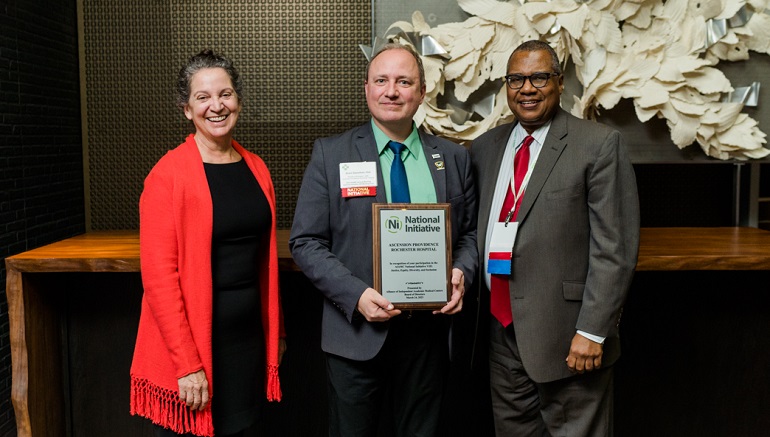
The Wayne State University Office of Graduate Medical Education has completed an 18-month curricular and recruitment initiative focused on Justice, Equity, Diversity and Inclusion, or JEDI, through the Alliance of Independent Academic Medical Centers.
The AIAMC National Initiative is the only national and multi-institutional collaborative of its kind in which residents and faculty lead multidisciplinary teams on projects aligned with their institution’s strategic goals. Sixty-seven hospitals and health systems and more than 1,200 individuals have participated in the AIAMC National Initiatives since 2007, driving change that has resulted in meaningful and sustainable outcomes. Each iteration is branded with a sequential Roman numeral.
In this latest initiative, dubbed NI-VIII JEDI, WSUGME and three WSU sole-sponsored residency programs at Ascension Providence Rochester Hospital worked to improve diversity and inclusiveness in the clinical learning environment. The 18-month project succeeded in increasing programs’ outreach and recruitment to more diverse student populations; opening avenues for discussion to improve learning environment inclusion; implementing health disparities curricula; and conducting a resident-led Professional Development Symposium focused on justice, equity, diversity and inclusion.
The initiative team included GME’s Director of Education R. Brent Stansfield, Ph.D.; Associate Dean and DIO Anne Messman, M.D.; Research Coordinator Heidi Kenaga, Ph.D.; Ascension Providence Rochester Hospital Chief Medical Officer Sheryl Wissman, M.D.; Family Medicine Program Director Eleanor King, M.D.; Internal Medicine Program Director Sarwan Kumar, M.D.; Transitional Year Program Director Tess McCready, D.O.; resident leaders Starling Tolliver, M.D. (Dermatology) and Jahanavi Ramakrishna, M.D. (Internal Medicine); and School of Medicine Office of Diversity and Inclusion Director Leah Robinson, Ph.D.
Dr. Stansfield attended the AIAMC’s final NI-VIII meeting in Nashville, Tenn., to present the School of Medicine JEDI outcomes. The AIAMC awarded Wayne State and Ascension Providence Rochester Hospital a plaque for their participation in the initiative.
The initiative’s accomplishments included:
- Increasing programs’ outreach and recruitment to more diverse student populations. All programs presented diversity efforts in an online public forum, led by Dr. Stansfield. Program directors detailed their efforts to ensure maximally inclusive learning environments. The session was well attended by fourth-year medical students around the country as well as Detroit-area physicians and concluded with a great discussion. Also, in collaboration with resident leaders Drs. Tolliver and Ramakrishna, WSU’s Graduate Medical Education program updated its recommendations for holding fair and equitable interviews for all programs, which were adhered to during the 2023 match season.
- Opening avenues for discussion to improve learning environment inclusion. Under the leadership of Dr. King, the Family Medicine program revised its Balint group process to facilitate conversation among residents about specific instances of friction in the learning environment that impeded inclusiveness. The innovative, resident-centered discussion has led to more robust understanding of how to address microaggressions in the workplace. Dr. King plans to publish the results of this work.
- Implementing health disparities curricula. Dr. Kenaga chaired the Health Disparities Task Force, assigned to devise a standard curriculum and provide curricular resources for each WSU-sole sponsored program. The goal was met in part by a new licensure requirement effective July 1, 2022: Michigan law mandated implicit bias training by all health care providers in the state. The effort helped resident trainees learn about disparities in health care access and effectiveness among different demographic populations in the Detroit metropolitan area, and in the nation.
- Conducting a resident-led Professional Development Symposium focused on JEDI. In spring of 2022, the WSU Resident Council hosted a slate of speakers for its annual Professional Development Symposium, a two-hour webinar on “Diversity, Equity, and Inclusion: Becoming a Catalyst for Change.” More than 80 interns, residents, faculty and staff attended, receiving certificates documenting completion of implicit bias training as part of the health care disparities curriculum.
Although the NI-VIII JEDI initiative concluded in March, its innovations will become standard in the curricula and recruitment protocols across GME residency programs. As noted by GME Associate Dean and DIO Dr. Anne Messman, “WSUGME’s work in the JEDI initiative will be connected to our continuing efforts to promote residents’ wellness and self-care, professionalism, and effective communication skills,” Dr. Messman said. “We will promote diversity and inclusiveness in clinical settings and continually confer with hospital leadership, residents and faculty on ways to enhance the training environments at our WSU sole-sponsored institutions.”